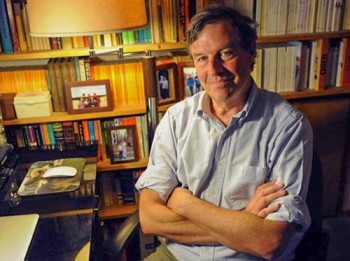Delighted and charmed also by the arrival of my author’s copy of Experimental Literature: A Collection of Statements, edited my Warren Motte and Jeffrey R. Di Leo. In it, you will find my essay “The Literature of Extinction.” The book is a special revised and expanded edition of American Book Review 37.5 (July/August 2016), where my essay originally appeared. It’s published by JEF Books, which is the book publishing wing of The Journal of Experimental Fiction.
I take particular pleasure in this publication in part because it cemented a friendship with Warren Motte, whom I met when I asked him to contribute to Numéro Cinq. Here is Warren.
Almost equally of importance is the fact that so many Numéro Cinq editors and contributors contributed to this book. Let me count the names: Douglas Glover (moi), Rikki Ducornet, Julie Larios, Michael Martone, Warren Motte (himself), Lance Olsen, and Eleni Sikelianos, This is a tribute to the sharpness of our cutting edge, the heft and depth of our community. I am pretty proud of this.
—dg
Here is the publisher’s description:
Literary Nonfiction. Essays. In EXPERIMENTAL LITERATURE: A COLLECTION OF STATEMENTS thirty-four writers and critics reflect upon how literature puts itself to the test in an effort to make itself new. Those reflections assume very different shapes, and each approaches the question from a different angle. There are formalist readings here, and historicist readings; some contributors consider the politics of literature, others focus upon aesthetics; some statements deal with national traditions or periods, others are more synchronist. There are pieces on French theater, the Russian avant-garde, and performance in West Africa. There are meditations on poetry as a daily practice, on experiment as a way of knowing, on the restlessness of liminal spaces, and on the incommensurate dimensions of dream and reality. Each contribution is fueled by the notion that literature works best when it is willing to interrogate its own premises. Both individually and collectively, these analyses display an extraordinary mobility, one that does justice to the dynamism of experimental literature itself. Each essay engages its readers actively and thoughtfully, inviting us to participate in a conversation about literature’s horizon of possibility, about what literature is and can be. Robert Coover, arguably the most distinguished living American experimentalist, contributes an afterword to this volume.

